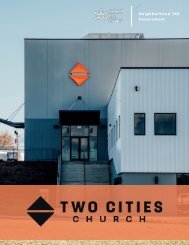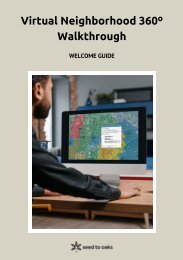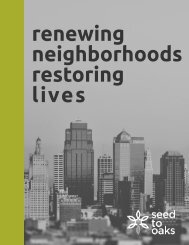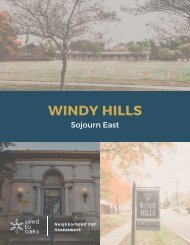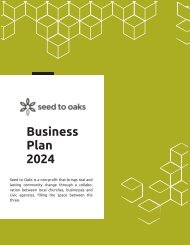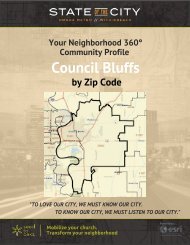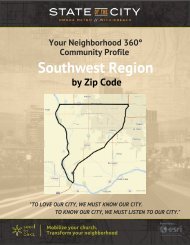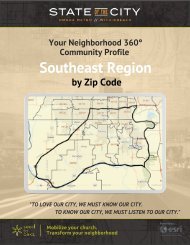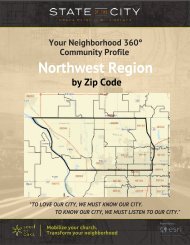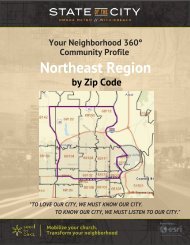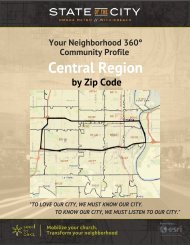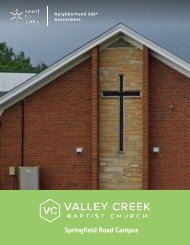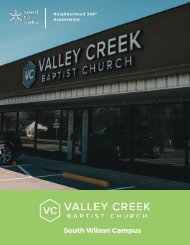Two Cities Church
The Neighborhood 360˚ Assessment findings of Two Cities Church in Winston-Salem, NC
The Neighborhood 360˚ Assessment findings of Two Cities Church in Winston-Salem, NC
Create successful ePaper yourself
Turn your PDF publications into a flip-book with our unique Google optimized e-Paper software.
Neighborhood 360<br />
Assessment
WELCOME TO YOUR<br />
NEIGHBORHOOD 360 ASSESSMENT<br />
Introduction<br />
Neighborhood Snapshot<br />
History of Industry Hill<br />
History of <strong>Two</strong> <strong>Cities</strong><br />
Demographics<br />
Neighborhood Observations<br />
Neighborhood Surveys<br />
Community and Cultural Tensions<br />
Community Wants, Needs, and Dreams<br />
<strong>Church</strong> Assets<br />
Takeaways<br />
Reflective Questions<br />
2<br />
3<br />
4<br />
5<br />
6<br />
7<br />
8<br />
10<br />
11<br />
14<br />
17<br />
20<br />
1
INTRODUCTION<br />
<strong>Two</strong> <strong>Cities</strong> <strong>Church</strong> is located in the<br />
Industry Hill community of Winston-<br />
Salem, North Carolina – a city center<br />
in a rapidly growing community. This<br />
neighborhood is bordered by Ivy<br />
Avenue, Patterson Avenue, North<br />
Liberty Street, and Martin Luther King<br />
Jr. Drive. Industry Hill connects<br />
multiple communities that look very<br />
different: East Winston and North of<br />
Downtown are historically African<br />
American neighborhoods with high<br />
levels of poverty and ongoing battles<br />
with gentrification. Downtown, a<br />
previous industrial center, is<br />
undergoing much modernization and<br />
revitalization due in major part to the<br />
medical industry.<br />
Now housed within these contrasting<br />
neighborhood dynamics, <strong>Two</strong> <strong>Cities</strong><br />
<strong>Church</strong> has the potential to leverage<br />
its assets for the benefit of the<br />
surrounding communities, the city as<br />
a whole, and most importantly, for the<br />
glory of God. To build meaningful<br />
relationships and intimately<br />
encounter the needs of the<br />
community, one must exist within the<br />
community. <strong>Two</strong> <strong>Cities</strong> <strong>Church</strong> now<br />
exists within the Industry Hill<br />
community and is poised to be an<br />
agent of Kingdom-centered change at<br />
the heart of the city we call home.<br />
2
NEIGHBORHOOD SNAPSHOT<br />
The community surrounding <strong>Two</strong> <strong>Cities</strong> <strong>Church</strong><br />
is home to several distinct neighborhoods. We<br />
are in the heart of the rapid growth of<br />
Downtown in industry, education, food, and<br />
recreation. Also within walking distance are<br />
communities in East Winston and North<br />
Winston with many pockets of poverty. Our<br />
immediate Downtown community of Industry<br />
Hill has one of the highest concentrations of<br />
homelessness due to surrounding shelters and<br />
other homeless-serving organizations. It is also<br />
a place of city expansion with new apartments,<br />
schools, and a growing Downtown culture.<br />
Winston-Salem as a whole is and has been a<br />
city that has seen a lot of change since its<br />
founding in 1936 but has consistently been a<br />
home for people who desire community during<br />
trying times.<br />
3
HISTORY OF INDUSTRY HILL<br />
The Downtown/Industry Hill<br />
neighborhood was previously an<br />
industrial center housing companies<br />
such as Hanesbrands and RJR Tobacco.<br />
With the 2008 market crash, major<br />
companies, like Hanes and RJR, were<br />
bought out which led to significant job<br />
loss. This also propelled the city to<br />
prioritize neighborhood revitalization.<br />
These revitalization efforts caused<br />
much of the poverty within the city to<br />
become more condensed than in any<br />
other major city in North Carolina. This<br />
concentrated poverty stands in contrast<br />
to the growing Downtown area that has<br />
become the center of innovation and<br />
culture for Winston, including a medical<br />
hub and growing arts district.<br />
Downtown Winston-Salem will continue<br />
to develop the medical and technology<br />
industries throughout the city as well as<br />
reinvent the city’s Downtown culture<br />
into one full of unique culinary choices,<br />
lively nightlife, and business/medical<br />
opportunities. Contrastingly,<br />
gentrification due to Downtown<br />
revitalization persists as does the clear<br />
distinction between socio-economic<br />
statuses caused by the increasing<br />
interaction between urban revitalization<br />
and urban poverty.<br />
4
HISTORY OF TWO CITIES<br />
The story of <strong>Two</strong> <strong>Cities</strong> <strong>Church</strong> begins at the Summit <strong>Church</strong> in Raleigh-Durham, North Carolina. The<br />
Summit <strong>Church</strong>, led by Pastor J.D. Greear, had a vision to plant 1,000 churches across the world over the<br />
next 40 years. <strong>Two</strong> <strong>Cities</strong> was birthed out of that vision, and Pastor Kyle Mercer was compelled to plant a<br />
new church in Winston-Salem, North Carolina. The church was planted with Executive Pastor David<br />
Vogel, Kyle’s best friend of 16 years. Together they recruited 30 other individuals who moved their lives<br />
to Winston-Salem in May 2016 for the sake of the Gospel and were joined by 70 more people to form<br />
the launch team. On September 18, 2016, <strong>Two</strong> <strong>Cities</strong> launched its first public gathering.<br />
Since then, <strong>Two</strong> <strong>Cities</strong> <strong>Church</strong> has flourished with Community Groups and leaders multiplying as well as<br />
hundreds of people getting plugged into the community to serve. In November 2018, <strong>Two</strong> <strong>Cities</strong> moved<br />
into two renovated warehouse buildings on Northwest Boulevard. Less than two years later we were<br />
named the 26th fastest growing church in America by Outreach Magazine. With this enormous growth<br />
came a need for more space. In December 2023, <strong>Two</strong> <strong>Cities</strong> opened a new building on North Patterson<br />
Avenue. The church is now housed in a location central to the Winston-Salem community putting <strong>Two</strong><br />
<strong>Cities</strong> at the heart of the city’s need. With this unique placement also comes the powerful opportunity<br />
for us to wrap our arms around the community and commit to being the hands and feet of God in the<br />
neighborhood.<br />
5
DEMOGRAPHICS<br />
<strong>Two</strong> <strong>Cities</strong> <strong>Church</strong> lies on the border of Winston-Salem census tracts 1 and 2. To get a better picture of the neighborhoods<br />
surrounding the church, demographic information has been pulled from 2021 data for census tracts 1 through 7.<br />
As of 2021, 17,954 people resided in the neighborhoods surrounding <strong>Two</strong> <strong>Cities</strong> <strong>Church</strong>’s current<br />
location making up roughly 7.17% of Winston-Salem’s population.<br />
The age breakdown of the residents in the communities corresponds to city data with the majority of<br />
residents being younger adults between 25 and 44 (30.5%) or children under 19 (27.6%). This aligns with<br />
family data which shows that half of families in the area have children under the age of 18.<br />
Racial diversity is one area in which Industry Hill and surrounding neighborhoods greatly differ from citywide<br />
data. In Industry Hill and surrounding areas, 67% of residents are Black and 15.3% are White while,<br />
city-wide, 29.5% of residents are Black and 44.7% are White. The percentage of residents identifying as<br />
Asian, Hispanic/Latino, two or more races, and other races is consistent across city and neighborhood<br />
data.<br />
Poverty levels in the neighborhoods surrounding <strong>Two</strong> <strong>Cities</strong> <strong>Church</strong> are also significantly higher than city<br />
averages. 23.79% of residents in these neighborhoods live below the poverty level<br />
compared to only 10.8% of residents in Winston-Salem overall. The mean income for this subset of<br />
neighborhoods is $47,787 which is $34,000 lower than the city mean income of $82,231.<br />
Whereas certain demographics look familiar compared to other areas in our city, we as a church must<br />
recognize the unique qualities of our neighborhood at a base level as we look to serve our neighbors well.<br />
In summary, <strong>Two</strong> <strong>Cities</strong> is located in a racially and socio-economically diverse area with a high percentage<br />
of young people.<br />
6
NEIGHBORHOOD OBSERVATIONS<br />
A number of <strong>Two</strong> <strong>Cities</strong> members observed various parts of the neighborhood around <strong>Two</strong> <strong>Cities</strong><br />
<strong>Church</strong> to examine the physical spaces and people nearby.<br />
BUSINESS - Many things in the area attract people to the neighborhood (breweries,<br />
restaurants, etc.). A number of small businesses are located in the vicinity as well as<br />
community nonprofits. A large biomedical community has also developed Downtown in the<br />
Innovation Quarter.<br />
BUILDINGS - Newer apartments have been built Downtown compared to lower-income<br />
housing North and East of Downtown. There are several vacant buildings and a significant<br />
amount of fencing.<br />
TRAVEL - Foot traffic is sparse in several locations; however, there was notable movement<br />
Downtown near the bus station and Industry Hill with varying diversity.<br />
HOMELESSNESS - Homelessness is evident throughout the area.<br />
C H U R C H E S A N D S P I R I T U A L L I F E<br />
There is an active spiritual awareness in the<br />
communities surrounding <strong>Two</strong> <strong>Cities</strong> <strong>Church</strong>.<br />
The number of churches and faith-based<br />
organizations displays that many people are<br />
involved with or familiar with church and spiritual<br />
topics. At least 26 churches or other religious<br />
institutions reside within the neighborhood<br />
including a variety of Christian denominations<br />
and a mosque.<br />
After talking with many people in the area, there<br />
was an overall positive response to a “new”<br />
church moving into the neighborhood. Most<br />
people were open to a church in the community<br />
and were hoping that some partnerships could be<br />
built in order to make a positive difference in the<br />
city. People also wondered if a church could help<br />
bring people together and build community.<br />
In addition to these positive associations, most<br />
people seemed to have presuppositions regarding<br />
spirituality based on their own experiences.<br />
7
NEIGHBORHOOD SURVEYS<br />
Residents of neighborhoods around <strong>Two</strong> <strong>Cities</strong> <strong>Church</strong> were surveyed about<br />
their opinions of their neighborhood. Respondents shared some common<br />
answers listed below.<br />
What do you like best about this community? What makes this a good place<br />
to live?<br />
LOW COST OF LIVING - Many residents appreciate the affordability of<br />
our community, allowing them to manage their expenses effectively and<br />
invest in their families' futures without financial strain.<br />
NEIGHBORS LOOKING OUT FOR EACH OTHER - The sense of<br />
camaraderie and support among neighbors is highly valued, as it creates a<br />
tight-knit community where people can rely on each other for assistance,<br />
fostering a strong sense of security and belonging.<br />
QUIET - The peaceful atmosphere and minimal noise pollution contribute<br />
to a serene environment that residents cherish, offering a respite from<br />
the hustle and bustle of city life and allowing for moments of tranquility<br />
and relaxation.<br />
COMMUNITY GROWTH - Residents appreciate the opportunities for<br />
personal and collective advancement within our community, as it fosters<br />
a spirit of collaboration, innovation, and progress, making it an ideal place<br />
to pursue their goals and aspirations while contributing to the collective<br />
welfare.<br />
What are one or two changes that could make life better for this community?<br />
FEELING SAFER - Implementing community policing initiatives and<br />
neighborhood watch programs can enhance residents' sense of safety by<br />
fostering greater vigilance and collaboration among neighbors, leading to<br />
a more secure environment for all.<br />
DECREASE IN HOMELESSNESS AND DRUG ACTIVITY - Addressing<br />
homelessness and drug activity through comprehensive support services,<br />
affordable housing initiatives, and rehabilitation programs can<br />
significantly improve the overall quality of life in the community by<br />
reducing social disorder and improving public health outcomes.<br />
MORE PLACES FOR KIDS/YOUTH TO GO AND MORE ACTIVITES FOR<br />
THEM IN COMMUNAL SPACES - Investing in the development of<br />
recreational facilities, after-school programs, and youth outreach<br />
initiatives can provide young people with safe and engaging opportunities<br />
for growth and socialization, enriching their lives and strengthening the<br />
fabric of the community.<br />
8
NEIGHBORHOOD SURVEYS<br />
Do you have any ideas about how a caring church could make a difference in the neighborhood?<br />
BUILD COMMUNITY AND ACTIVITY FOR KIDS AND YOUTH: A caring church could help establish<br />
youth groups, sports teams, and educational programs to provide constructive outlets and<br />
mentorship for young people, fostering a sense of belonging and purpose within the community.<br />
OPPORTUNITES: Organize regular youth events like movie nights, game nights, or sports<br />
tournaments; offer tutoring or homework help sessions; collaborate with local schools for joint<br />
activities or workshops.<br />
REACH OUT AND BRING THE COMMUNITY TOGETHER/BE A PART OF THE COMMUNITY - The<br />
church could help with regular community events such as picnics, potlucks, and workshops, creating<br />
opportunities for neighbors to connect, share resources, and build relationships in a welcoming<br />
environment.<br />
OPPORTUNITES: Organize neighborhood cleanup days; host a community garden or farmers'<br />
market; offer free classes or workshops on topics of interest to the community.<br />
TALK TO THE COMMUNITY PERSONALLY AND EXTEND PERSONAL INVITATIONS - Members of<br />
the church could engage in door-to-door outreach, personally inviting neighbors to attend services,<br />
events, or support programs, demonstrating genuine care and interest in their well-being.<br />
OPPORTUNITES: Conduct neighborhood surveys to assess community needs and interests;<br />
host open houses or "meet the pastor" events; organize volunteer teams to visit elderly or<br />
isolated community members.<br />
HELP THE HOMELESS - The church could establish outreach programs providing essential<br />
resources such as food, clothing, and shelter for homeless individuals, as well as offering support<br />
services and opportunities for rehabilitation and reintegration into society.<br />
OPPORTUNITIES: Continue to partner with local shelters or social service agencies; organize<br />
donation drives for essential items; offer job training, workplace readiness, or resume workshops<br />
for homeless individuals seeking employment.<br />
PARTNER WITH OTHERS: The church can continue to collaborate with other community<br />
organizations, businesses, and government agencies to maximize resources and address complex<br />
social issues such as poverty, education, and healthcare.<br />
OPPORTUNITES: Form partnerships with local nonprofits, schools, or healthcare providers;<br />
participate in community coalitions or task forces; advocate for policy changes to address<br />
systemic issues affecting the community.<br />
Across all community surveys, there were five major themes:<br />
1. ISOLATION - People feel isolated and are hungry for community. At the same time, they do not know<br />
where to start. Sometimes people wonder if the community they are looking for exists.<br />
2.GROWTH - People feel the growth and expansion of our city, especially Downtown.<br />
3.SAFETY - People are concerned about safety in certain areas of their neighborhoods.<br />
4.NEED - People notice the many physical and emotional needs of individuals in the area.<br />
5.ENGAGEMENT - People desire to see community engagement.<br />
9
COMMUNITY AND CULTURAL TENSIONS<br />
Many of the themes in the neighborhood surveys were reflected in other interactions with<br />
neighborhood residents as tensions they feel in the community.<br />
ISOLATION - Lack of community<br />
SAFETY - Addiction, violence, mental health challenges<br />
GENTRIFICATION - Downtown expansion, rising costs, blending of neighborhoods<br />
DIVISION - Socio-economic and racial divides that have been long-time tensions in Winston-<br />
Salem<br />
HOMELESSNESS/POVERTY - Rising cost of living, addiction, and mental health<br />
10
COMMUNITY WANTS, NEEDS, AND DREAMS<br />
W H A T O U R C O M M U N I T Y W A N T S<br />
COMMUNITY - Residents desire a sense of belonging and connection within their neighborhood, where<br />
people know and support each other like an extended family.<br />
PRACTICAL SOLUTION - The church could work with other organizations for regular community<br />
gatherings, such as block parties or neighborhood picnics, to facilitate interactions and strengthen<br />
bonds among residents.<br />
SUPPORT FOR PHYSICAL, MENTAL, AND SPIRITUAL NEEDS - Community members seek holistic<br />
support systems that address their physical health, mental well-being, and spiritual growth.<br />
PRACTICAL SOLUTION - The church could work with other organizations and establish resources in<br />
the community to create a wellness center, offering a range of services, including counseling, health<br />
screenings, exercise classes, and spiritual guidance sessions.<br />
CONSISTENT RELATIONSHIPS - Residents value stable and meaningful relationships characterized by<br />
trust, respect, and mutual support.<br />
PRACTICAL SOLUTION - The church could initiate or partner in a community mentorship program<br />
matching volunteers with individuals seeking guidance and companionship, fostering lasting<br />
relationships and personal growth.<br />
SAFETY AND PEACE - Community members prioritize living in a safe and peaceful environment where<br />
they feel secure and protected.<br />
PRACTICAL SOLUTION - The church could collaborate with local law enforcement agencies to<br />
implement neighborhood watch programs, safety workshops, and conflict resolution training,<br />
empowering residents to actively contribute to the security of their community.<br />
11
COMMUNITY WANTS, NEEDS, AND DREAMS<br />
W H A T O U R C O M M U N I T Y N E E D S<br />
HEALTHY ACTIVITY AND COMMUNITY FOR YOUTH - There is a need for constructive and<br />
engaging activities that promote the physical, social, and emotional development of young people.<br />
PRACTICAL SOLUTION - The church could help with or support a youth center equipped with<br />
recreational facilities, educational resources, and mentorship programs, offering a safe and<br />
supportive environment for youth to thrive and grow.<br />
ADDICTION AND LIFE-SKILLS HELP - Many community members require assistance in<br />
overcoming addiction and acquiring essential life skills to lead fulfilling and independent lives.<br />
PRACTICAL SOLUTION - The church could continue to connect with addiction recovery support<br />
groups, vocational training programs, and financial literacy workshops, empowering individuals to<br />
break free from destructive cycles and build a brighter future.<br />
DECREASE IN VIOLENT ACTIVITY, INCLUDING DOMESTIC VIOLENCE - There is a pressing need<br />
to address and reduce instances of violence, including domestic abuse, within the community.<br />
PRACTICAL SOLUTION - The church could continue to partner with local advocacy<br />
organizations, shelters, and law enforcement agencies to offer counseling services, legal<br />
assistance, and safe havens for victims of domestic violence, as well as educational programs<br />
promoting healthy relationships and conflict resolution skills.<br />
HELP WITH HOUSING, EDUCATION, HEALTHCARE, AND ECONOMIC MOBILITY - Community<br />
members require access to essential resources and opportunities for upward mobility.<br />
PRACTICAL SOLUTION - The church could continue building connections to resource centers<br />
providing information and referrals for housing assistance, educational scholarships, healthcare<br />
services, and job training programs while advocating for policies that promote social and<br />
economic growth within the community.<br />
12
COMMUNITY WANTS, NEEDS, AND DREAMS<br />
W H A T O U R C O M M U N I T Y D R E A M S<br />
CHURCHES COMING TOGETHER - Residents envision a collaborative and unified effort among<br />
churches to address common challenges and opportunities within the community.<br />
PRACTICAL SOLUTION - The church could initiate dialogue and collaboration with other churches,<br />
organizing joint community service projects and outreach initiatives to foster unity and solidarity<br />
among churches with a gospel vision.<br />
COMMUNITY COMING TOGETHER - There is a collective aspiration for increased cohesion and<br />
cooperation among residents to build a stronger and more inclusive community.<br />
PRACTICAL SOLUTION - The church could facilitate or participate in community forums, leadership<br />
training workshops, and cultural exchange events, encouraging dialogue, understanding, and<br />
collaboration among neighbors from different backgrounds and perspectives.<br />
INTEGRATION OF WINSTON-SALEM UNIFICATION WITHIN NEIGHORHOODS ON RACIAL, AGE,<br />
AND SOCIO-ECONOMIC LEVELS - Residents dream of a more integrated and inclusive community<br />
where diversity is celebrated and everyone has equal opportunities for success.<br />
PRACTICAL SOLUTION - The church could be part of initiatives promoting community such as<br />
multicultural festivals, intergenerational mentorship programs, and economic development projects<br />
that prioritize marginalized communities, fostering a more communal neighborhood.<br />
PREVENTATIVE CARE FOR LONG-TERM TRANSFORMATION (SOCIAL, PHYSICAL, EMOTIONAL,<br />
RELATIONAL, ETC.) - There is a shared vision for comprehensive and proactive strategies that address<br />
the root causes of social issues and promote holistic well-being.<br />
PRACTICAL SOLUTION - The church could help implement or support holistic wellness programs<br />
focusing on preventive care, including mental health awareness campaigns, nutrition and fitness<br />
classes, parenting workshops, and conflict resolution training, empowering individuals and families<br />
to lead healthier, more fulfilling lives and fostering long-term transformation within the community.
CHURCH ASSETS<br />
B A S I C A S S E T S<br />
PHYSICAL ASSETS - <strong>Two</strong> <strong>Cities</strong> <strong>Church</strong> boasts a new building space with a 1300 seating capacity,<br />
along with two additional spaces on Northwest Blvd dedicated to youth ministry.<br />
INDIVIDUAL ASSETS - With around 3,000 attendees, 1318 members, 8 full-time pastors, 23 full-time<br />
staff, 5 part-time staff, 11 residents, and 2 interns, as well as a significant presence of medical<br />
professionals and medical students, the church possesses a rich reservoir of human resources and<br />
expertise.<br />
MINISTRY GROUPS ASSETS - The church boasts a diverse array of ministry groups, including over<br />
100 Community Groups, Kids Ministry, Youth Ministry, DNA Groups, Prayer Team, First Impressions<br />
Team, Weekender Team, Mercy Team, Worship Arts Team, Production Team, Photography Team, and<br />
Adoption & Foster Care Team.<br />
INSTITUTIONAL ASSETS - Supported by resources from The Summit <strong>Church</strong>, The Southern Baptist<br />
Convention, The Summit Collaborative, The Triad <strong>Church</strong> Network, and Christ Together Network, <strong>Two</strong><br />
<strong>Cities</strong> <strong>Church</strong> benefits from institutional backing and collaboration within broader religious networks.<br />
ECONOMIC ASSETS - With monthly consistent giving from church members, an annual budget, and<br />
the impactful Annual Hold the Rope offering, the church demonstrates financial stability and<br />
generosity in its mission endeavors.<br />
14
CHURCH ASSETS<br />
H I D D E N A S S E T S<br />
SIGNS OF GRACE - Noteworthy signs of grace include the almost 1-million-dollar Hold the Rope<br />
End of Year Offering in 2023, budget allocation for opening new buildings, growth in the residency<br />
program, increased neighborhood involvement with over 30 organizations, and vibrant engagement<br />
with church events such as baptisms and Weekender attendance.<br />
TAKEN FOR GRANTED GIFTS - These include influence within the city, consistent giving and<br />
attendance, trust in leadership, and a strong serving community ethos.<br />
PERCEIVED GIFTS BY OTHERS - Outsiders would likely recognize the church as a strong serving<br />
community with a culture of consistent giving, known for its Weekender events facilitating church<br />
integration and engagement, and admired for its gospel-centered, relational approach and leadership<br />
pipeline strategy.<br />
UNDERUTILIZED STRENGTHS - The untapped potential in utilizing people and space beyond<br />
Sunday worship for community-building activities.<br />
15
CHURCH ASSETS<br />
A S S E T S D I S G U I S E D A S N E E D S<br />
CRISIS-GENERATED ASSETS - Crisis situations have catalyzed further development in areas like<br />
the Care Ministry, while challenges like increased sin and suffering within the church due to its size<br />
and age have prompted a deeper reliance on Community Group-based care.<br />
GIFTS PERCEIVED AS NEEDS - Rapid growth in attendance and Weekender events, while<br />
beneficial, occasionally strain volunteer resources, highlighting the need for consistent volunteer<br />
engagement.<br />
ASSET FOCUS IN ADDRESSING NEEDS - The church prioritizes individual spiritual growth and<br />
community engagement as the primary focus in addressing specific needs.<br />
16
TAKEAWAYS<br />
W H A T W E W A N T O U R P A S T O R S T O K N O W<br />
People are looking to see what we do as a church of influence. God has placed us in the heart of our<br />
city where there is density and diversity. We must focus on making and mobilizing disciples where<br />
God has us.<br />
There is a large socio-economic difference between the different communities surrounding us. We<br />
must handle this with care as we minister to the various groups of people. We must be willing to<br />
build relationships with different types of people with this mission of making and mobilizing<br />
disciples in mind.<br />
We need to continue to build strong relationships with organizations and consider how we can<br />
support or add to what’s being done to meet needs.<br />
17
TAKEAWAYS<br />
W H A T W E W A N T O U R C H U R C H M E M B E R S T O K N O W<br />
While there is a ministry we must do in the church, there is a mission God has called us to do outside<br />
of our church in our personal communities and in our community immediately surrounding the<br />
church.<br />
We are needy and needed. Serve out of your brokenness and see each relationship as a God-given<br />
opportunity to love someone made in God’s image.<br />
Ask God how you can best serve, love, and build relationships with the people within the strategic<br />
place He has placed our church instead of waiting for the church to simply tell you what to do.<br />
18
TAKEAWAYS<br />
W H A T W E W A N T O U R<br />
C O M M U N I T Y T O K N O W<br />
We are here on purpose<br />
and here to stay. We<br />
want to be good<br />
neighbors and care for<br />
the individual as well as<br />
our community as a<br />
whole. We want to be<br />
joining in what God is<br />
already doing in our<br />
community.<br />
We are a gospel people<br />
devoted to making and<br />
mobilizing disciples in an<br />
environment of prayer<br />
and worship. Salvation is<br />
found in Christ alone<br />
and is given to all who<br />
place their trust solely in<br />
Him.<br />
A person is not simply a<br />
statistic, but an<br />
individual made in the<br />
image of God no matter<br />
their age, stage of life,<br />
financial status, or past<br />
decisions. God is near.<br />
Patience is requested as<br />
we continue to grow and<br />
learn in ministry,<br />
mission, and mercy as a<br />
church.<br />
19
REFLECTIVE QUESTIONS<br />
1. What, if anything, has changed in your understanding of the<br />
community around <strong>Two</strong> <strong>Cities</strong>?<br />
2. What new opportunities do you see for <strong>Two</strong> <strong>Cities</strong> to love and<br />
connect with our community as a result of this study?<br />
3. How do you imagine this study will change or impact our<br />
church?<br />
4. How might your community group use the insights in this<br />
study to engage and connect with the community around you?<br />
20




